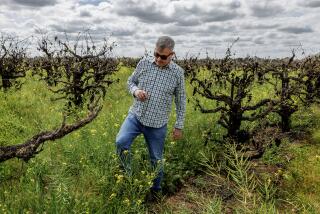English Wine Now Exported to France
- Share via
SINGLETON, England — People may scoff at English wines, but England’s wine making is seeing some of its best harvests since the Middle Ages.
“Chateau Frogmore” or “Another glass of Huxelrebe?” lacks continental cachet, but English grape growers insist that their quality is worthy of a toast by Bacchus.
“There is no doubt about it--English wines are getting better and better,” said Geoffrey Bond, chief executive of the English Vineyards Assn.
An English vineyard has brought off a major trading coup by winning a prestigious export order to supply leading Parisian wine merchant Nicolas with its 1986 dry white wine.
Elmham Park, from Norfolk in east England, had been supplying the British Embassy in Paris for some time.
Greater Acreage
Another English grower, David Carr-Taylor, is supplying leading French hotels and restaurants with his sparkling wine, the only one produced commercially in England.
Millions of dollars are invested in the country’s 265 commercial vineyards despite the unpredictable climate.
Acreage under vines has jumped from five to more than 1,500 in less than 30 years. About 105,000 gallons of wine were produced in 1987 and growers hope to top that this fall. Wine making courses are springing up as English vintages gain a place at the tables of Queen Elizabeth II, Prime Minister Margaret Thatcher and prestige hotels. Harrods department store and many supermarkets routinely stock it, and some brands are even exported to the continent.
Run Into Snobbery
But winning over snobbish gourmets is still difficult.
“Our biggest problem is overcoming people’s prejudices against local wines,” said Maureen Aikman, who runs a vineyard and London’s only shop devoted to domestic wines. “They think it’s bad if it isn’t French.”
Marketing is also a problem--about 65% of English vineyards sell their wines only at the farm gate--and constant rain and cold weather make mass production tough.
“A good harvest year? There are never any good years,” Ian Paget told a visitor at his Chilsdown Vineyard near the southern town of Singleton. “We don’t talk about profits.”
Grape growing is capital intensive, requiring at least $12,750 an acre to set up a vineyard and maintain it for three years before wine can be made.
Heavy Duties
The government has incurred the wrath of many growers, who oppose high excise duties on local wines for domestic use.
Duties at more than $1.20 a bottle are higher than in other European Community countries and price English wines at least $1.70 per bottle above comparable German and French ones.
Because of England’s small harvests, English wine makers do not qualify for EC subsidies but are free of European Community controls on the types of vines grown in different areas.
English wines are still far from the appellation controlee mark of quality and sport the simple mark “table wine.” Bond said the EC requires vineyards to produce and have a reputation for quality for some time.
Started With Romans
Vintners produce mainly dry to medium white wines from grapes of German origin that ripen well in England’s uncertain climate. The range also includes French-style champagne, honey mead and elderberry wine, and organically grown grapes.
The Romans planted the first British vineyards about 2,000 years ago. The practice flourished in medieval times, but many vineyards were abandoned in the 12th Century when King Henry II’s marriage to Eleanor of Aquitaine guaranteed a steady flow of claret from Bordeaux, France.
Henry VIII’s 1536 dissolution of monasteries dealt another blow to English viniculture. In modern times, it became a pastime of country squires.
The renaissance began after World War II, when methods grew more sophisticated and competition from imported fruit and beers spurred farmers to diversify.
Wine drinking in Britain is estimated to have doubled over the past decade to more than 600 million bottles a year.
Bond hopes that England will eventually have a thriving, recognized wine industry and notes that the number of growers has increased 10% yearly since 1967.
But he admitted: “We will never rival anything continental. We may be digging a Channel tunnel but we have a different soil and climate. Like so much that is British, it is a compromise.”
More to Read
Eat your way across L.A.
Get our weekly Tasting Notes newsletter for reviews, news and more.
You may occasionally receive promotional content from the Los Angeles Times.










